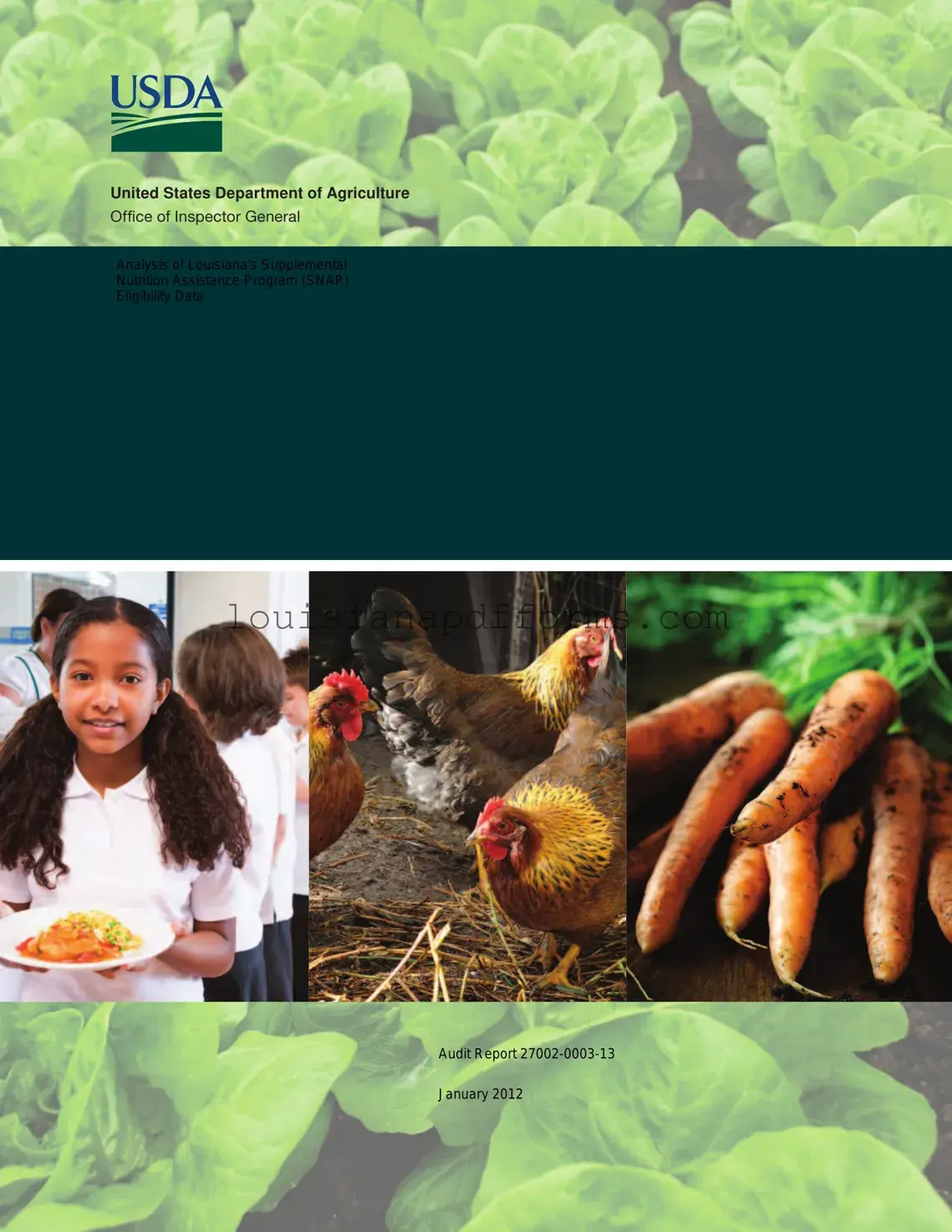United States Department of Agriculture
Office of Inspector General
Analysis of Louisiana's Supplemental
Nutrition Assistance Program (SNAP)
Eligibility Data
Audit Report 27002-0003-13
United States Department of Agriculture
Office of Inspector General
Washington, D.C. 20250
DATE: |
January 31, 2012 |
AUDIT |
|
NUMBER: |
27002-0003-13 |
TO: |
Audrey Rowe |
|
Administrator |
|
Food and Nutrition Service |
ATTN: |
Mark Porter |
|
Acting Director |
|
Office of Internal Control |
|
Audits and Investigations |
FROM: |
Gil H. Harden |
|
Assistant Inspector General |
|
for Audit |
SUBJECT: |
Analysis of Louisiana’s Supplemental Nutrition Assistance Program (SNAP) |
|
Eligibility Data |
This report presents the results of the subject review. Your written response to the official draft is included at the end of this report. Excerpts of your January 19, 2012, response and the Office of Inspector General’s position are incorporated into the applicable sections of the report.
Based on your response, we have reached management decision on all of the report’s recommendations. Please follow your internal agency procedures in forwarding final action correspondence to the Office of the Chief Financial Officer. Also, please note that Departmental Regulation 1720-1 requires final action to be completed within 1 year of the date of management decision to preclude being listed in the Department’s annual Performance and Accountability Report.
We appreciate the courtesies and cooperation extended to us by members of your staff during our audit fieldwork and subsequent discussions.
.
Table of Contents |
|
Executive Summary |
1 |
Recommendation Summary |
2 |
Background and Objectives |
3 |
Background |
3 |
Objective |
4 |
Section 1: SNAP Eligibility Oversight Needs Strengthening |
5 |
Finding 1: FNS Should Strengthen its Oversight of DCFS’ Eligibility |
|
Review for SNAP |
5 |
Recommendation 1 |
7 |
Recommendation 2 |
8 |
Recommendation 3 |
8 |
Scope and Methodology |
9 |
Abbreviations |
10 |
Exhibit A: Summary of Monetary Results |
11 |
Agency’s Response |
13 |
Analysis of Louisiana’s Supplemental Nutrition Assistance Program (SNAP) Eligibility Data (27002-0003-13)
Executive Summary
The Food and Nutrition Service’s (FNS) Supplemental Nutrition Assistance Program (SNAP), formerly known as the Food Stamp Program, provides monthly food assistance and nutrition for the health and wellbeing of more than 40 million low-income individuals.1 The Office of Inspector General (OIG) initiated this audit in January 2011 to analyze the Louisiana SNAP participant database to identify anomalies that may result in ineligible participants receiving SNAP benefits.
Of the 825,918 average monthly recipients in Louisiana as of September 2010, we found
2,337 recipients (.3 percent) who were deceased, were using deceased individuals’ Social Security numbers (SSN), had invalid SSNs, were receiving duplicate benefits in Louisiana, exceeded income requirements, or were receiving benefits simultaneously with one of five nearby States.2 While Louisiana’s Department of Children and Family Services (DCFS) has taken several steps to safeguard against potential fraud, waste, and abuse, there is still some opportunity for improvement. DCFS, which administers SNAP, does not perform all checks necessary to ensure SNAP benefits go only to those who are eligible. Specifically, it does not check for deceased participants nor does it perform some edit checks that would help ensure that the participant information that is entered is accurate. Also, though DCFS uses the Public Assistance Reporting Information System (PARIS) database to check for duplicate enrollment across States, this system does not include all participants nationwide because FNS does not require States to participate in PARIS or to check for interstate participation.
In all, the 2,337 participants whose eligibility should have been researched cause us to question approximately $303,273 in benefits per month, based on the average monthly amount a recipient receives in Louisiana.3 With a 27 percent increase in participation since 2007, SNAP is a rapidly growing program in Louisiana. If DCFS does not take measures to increase preventative and fraud detection efforts, it risks making continued payments to individuals who are not eligible for SNAP benefits.
1For Fiscal Year 2010.
2Nearby States included Alabama, Florida, Mississippi, Missouri, and Texas.
3Potential improper payments are based upon the average amount a recipient receives in Louisiana each month ($129.77). We were not able to determine the actual amount because payments are calculated by household, not individual; therefore, even if one participant is ineligible—such as a deceased participant—it is possible that other members of the household are eligible to receive benefits at a lower amount. Additionally, because Louisiana’s participant start dates may not be accurate, it is uncertain how long these individuals had been receiving benefits, and therefore difficult to determine total payments made to that individual.
AUDIT REPORT 27002-0003-13 |
1 |

Recommendation Summary
FNS should provide guidance to ensure that DCFS is using a comprehensive, national Social Security Administration (SSA) database to perform its death matches and SSN verifications. FNS should also provide guidance for DCFS to utilize regular edit checks to verify the information in participant databases is accurate. In addition, FNS needs to require DCFS to review the 2,337 individuals identified in this report and determine if those participants have received improper payments, and recover as appropriate.
Agency Response
FNS concurs with our recommendations and is actively engaged in a dialogue with regional offices and with States regarding policies and technical assistance tools which can strengthen integrity to an even greater extent. FNS has final rules in process that will codify the requirement for the SSA death match with expected publication in early 2012. FNS also issued a policy memo on November 15, 2011, reminding States of the death and prisoner matching requirement. The State has committed to following up on the 2,337 individuals identified and estimates completion by September 30, 2012.
OIG Position
OIG concurs with FNS’ response that a policy be issued to codify the States’ requirement to use the SSA death match matching to identify participants improperly receiving SNAP benefits. OIG concurs with Louisiana’s response concerning follow-up on the 2,337 individuals identified in the report to determine if they received improper payments. We reached management decision on the report’s three recommendations.
2 AUDIT REPORT 27003-0003-13
Background and Objectives
Background
FNS’ SNAP program, formerly known as the Food Stamp Program, provides monthly food assistance and nutrition for the health and wellbeing of more than 40 million low-income individuals. Louisiana had 825,918 individuals—or 18 percent of the State’s population—enrolled in SNAP as of September 2010. Since 2007, the program has grown by 27 percent in Louisiana. While FNS pays the full cost of recipient benefits, both FNS and the States share the program’s administrative costs.
For enrollment and eligibility procedures, SNAP regulations at the Federal level specify minimum guidelines, such as maximum income requirements, to be enforced by the State agencies; however, these regulations did not establish a standardized system of internal control at the State level. FNS’ policy is to allow State agencies the flexibility to establish control systems that meet the individual needs of each State. For example, Federal regulations allow State agencies to determine whether or not they will interview recipients face-to-face or on the telephone prior to granting benefits. In Louisiana, DCFS performs telephone interviews for most applicants as opposed to face-to-face interviews. Each State agency owns and maintains its own eligibility system—including software and databases—which vary from State to State.
In Louisiana, applicants submit documents to prove citizenship, income, and expenses. To continue in the program, participants are required to verify their need for SNAP benefits during an interim review every 6 to 12 months, depending on the applicant’s status.4 Participants in SNAP apply and are approved or denied by DCFS based on pre-established eligibility requirements.
State agencies also have the primary responsibility for monitoring recipients’ compliance with program requirements and for detecting and investigating cases of alleged intentional program violation.5 Once applicants have submitted information, either during enrollment or the interim review process, DCFS performs several automated data checks to validate selected information submitted, including SSNs. State agencies are required to establish a system to ensure that certain prisoners do not receive benefits.6 State agencies must also check recipient data against a national
4Participants who are aged or disabled and receive Supplemental Security Income only need to verify their information every 12 months. All other participants must recertify every 6 months.
5An intentional program violation is defined as any act violating the Food Stamp Act, the Food Stamp Program regulations, or any State statute for the purpose of using, presenting, transferring, acquiring, receiving, possessing, or trafficking SNAP benefits. The definition includes any act that constitutes making a false or misleading statement or concealing or withholding facts.
6Public Law (PL) 105-33, Balanced Budget Act of 1997, Section 1003 (a) (1), dated August 5, 1997; and
PL 114-246, The Food and Nutrition Act of 2008, Section 11(r), dated October 1, 2008.
AUDIT REPORT 27002-0003-13 |
3 |
SSA database, which can be accessed using SSA’s State Verification Exchange System (SVES), 7 to ensure that deceased recipients do not receive benefits.8 In addition, DCFS utilizes additional national and State database systems to verify income and employment information provided by applicants.
Objective
OIG initiated this audit to analyze the Louisiana SNAP participant database to identify anomalies that may indicate in ineligible participants receiving SNAP benefits.
7Provided at no cost to State agencies, SVES matches against several national databases to check for death and SSN verification for every submitted individual. SSA’s Death Master File also checks SSNs nationwide to search for deceased individuals.
8PL 105-379, An Act to Amend the Food Stamp Act of 1997, Section 1(a), dated November 12, 1998.
4 AUDIT REPORT 27003-0003-13
Section 1: SNAP Eligibility Oversight Needs Strengthening
Finding 1: FNS Should Strengthen its Oversight of DCFS’ Eligibility Review for SNAP
We found that of the 825,918 average monthly recipients in Louisiana as of September 2010, 2,337 recipients (.3 percent) were deceased or were using deceased individuals’ SSNs, had invalid SSNs, were receiving duplicate benefits in Louisiana, exceeded income requirements, or were receiving benefits simultaneously with one of five nearby States. While DCFS has taken several steps to safeguard against potential fraud, waste, and abuse, there is some opportunity for improvement. Specifically, DCFS does not check for deceased participants nor does it perform some edit checks that would ensure the participant information is entered accurately. Additionally, though DCFS uses the PARIS database to check for duplicate enrollment across States, this system does not include all participants nationwide because FNS does not require States to participate in PARIS or States to check for interstate participation. Not performing these checks increases the risk of improper payments.
To verify that benefits are not issued to individuals who are deceased, DCFS, like all agencies who administer SNAP, is required to compare the information in the SNAP participant database with national SSA death information. When we used SSA’s Death Master File to perform this check ourselves, we found that 723 current Louisiana SNAP participants’ SSNs were listed in SSA’s Death Master File.9 Presently, Louisiana does not perform a continuous death match due to FNS’ policy on simplified reporting, which only requires reporting changes such as income, and does not require reporting of deaths until the recertification period when the participant reapplies for SNAP. 10 DCFS stated that they are performing this match upon application and at recertification. According to Public Law 105-379, States are required to perform a match to identify deceased individuals, and use the information to ensure that benefits are not issued to individuals who are deceased.11 The last time Louisiana conducted such a match was on April 21, 2010. Furthermore, DCFS does not have any current plan to check for deceased individuals in the future. Of the 723 deceased individuals we identified in our match, we found 146 individuals who were enrolled as a one-person household and benefits on the account were used after their date of death.12
We also found individuals using invalid SSNs. DCFS’ procedure is to verify an applicant’s SSN when initially applying for SNAP. State officials stated that in the past, case workers were instructed to assign temporary SSNs when an error was found or when a SSN needed to be updated into the system. Also, if participants cannot provide a valid SSN at the time of enrollment, the system automatically assigns a temporary SSN. If by the end of the first full
9The SSA Death Master File (DMF) is used by leading government, financial, investigative, credit reporting, and medical research organizations as well as other industries to verify individuals who have died.
107 CFR 273.12(a)(5) requires States to act on all changes reported by a household that would increase its benefits, and to act on changes that would decrease a household’s benefits in certain circumstances.
11PL 105-379, An Act to Amend the Food Stamp Act of 1997, Section 1(a), dated November 12, 1998.
12This test could only be performed on one-person households. When there are multiple people in a household, the system cannot distinguish which member of the household is using the benefits.
AUDIT REPORT 27002-0003-13 |
5 |








